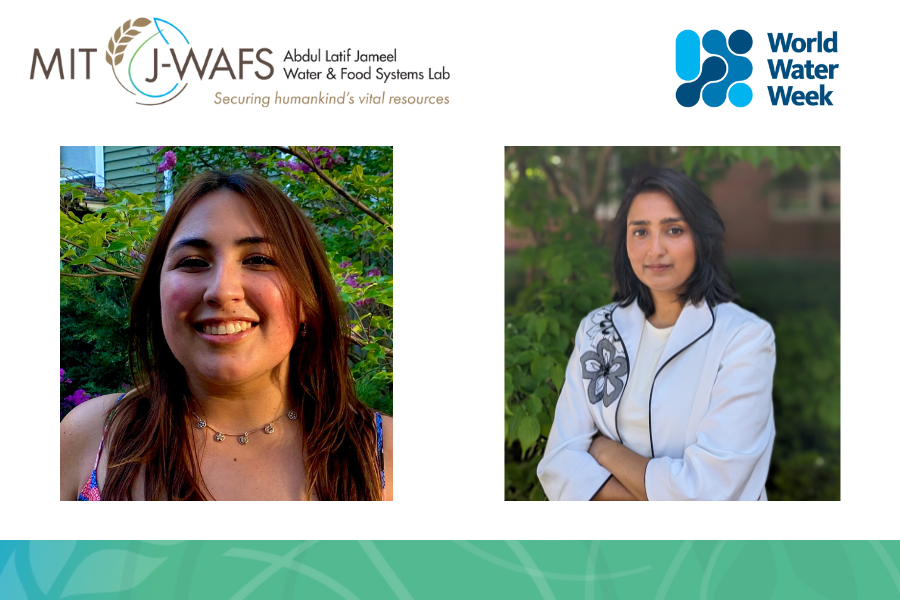News J-WAFS announces 2024 Travel Grantees to attend World Water Week
Two outstanding MIT graduate students will receive funding to attend the water conference in Sweden this summer.
Jiaqi Zhang June 11, 2024

Every year, J-WAFS offers travel grants for MIT graduate students to attend water sector conferences. The grants provide learning and networking opportunities for MIT students who are pursuing careers in the water sector, whether in academia, non-profits, government, or industry. Today, J-WAFS is happy to announce that two outstanding students were selected to receive funding to attend the Stockholm World Water Week conference. Daniela Morales and Shubhi Goyal, both of the Department of Urban Studies and Planning, will travel to Sweden with J-WAFS support in August, 2024.
Stockholm World Water Week is a major annual conference for people across sectors who are working on global water issues, organized by the Stockholm International Water Institute (SIWI). This year, the theme of World Water Week is ‘Bridging Borders: Water for a Peaceful and Sustainable Future,’ which focuses on water cooperation for peace and security. This theme calls on humanity to recognize the regional and global interconnectedness of communities and nations, and underscores the collaborative efforts required to protect humanity’s vital water resources and ensure access for all.
The J-WAFS Travel Grant for Water Conferences is supported by gifts to J-WAFS from Xylem Inc. and GoAigua, both J-WAFS Research Affiliates and water technology companies. Xylem is also a global sponsor of World Water Week, as well as the Stockholm Junior Water Prize, which is awarded during the event. The J-WAFS Travel Grantees will be able to attend a wide variety of programmed events at World Water Week, and will be able to participate in additional opportunities to meet with Xylem leaders and attend Xylem-sponsored side events.
Learn more about each of the 2024 grantees below.
Daniela Morales is a second-year master’s student in city planning at MIT’s Department of Urban Studies and Planning. Her research interests involve drinking water quality and access in rural and peri-urban areas affected by climate change impacts; the effects of municipal water shutoffs on marginalized communities; and the relationship between regional water management and public health outcomes.
With ties to Mexico City and California’s Central Valley, two areas where access to clean, centralized drinking water is a persistent issue, Morales developed a deep-rooted passion for water justice. This led her to pursue a public health degree focused on environmental justice in college, where she not only deepened her understanding of environmental health issues, but also shared her knowledge with peers. Post-graduation, Morales furthered her research on water quality in Paradise, California, incorporating both quantitative and qualitative data, emphasizing the importance of community-based participatory research. Before coming to MIT, Morales worked as an analyst at John Snow Inc., a national public health consulting firm, and as a research assistant conducting environmental health and water research at the Public Health Institute. Morales received a BA in public health and a BS in conservation and resource studies at the University of California, Berkeley in 2019.
Morales's continued dedication to learning about water resource management, climate adaptation, and the necessity for cross-disciplinary collaboration propels her ambition to participate in Stockholm World Water Week, where she hopes to expand her knowledge, engage with global experts, and refine her research and career trajectory in this vital field.
Shubhi Goyal is currently pursuing a master’s degree in city planning at MIT’s Department of Urban Studies and Planning. She is interested in leveraging local, nature-based, indigenous solutions for addressing climate-related challenges and enhancing disaster resiliency. Her current efforts, supported by the World Monuments Fund, focus on conserving and readapting traditional water management strategies in Kathmandu, Nepal to address the Valley’s pressing water challenges.
Goyal's connection to water issues in Kathmandu was profoundly shaped by two catastrophic events that she experienced there: the 2015 earthquake and the 2021 flood. Witnessing the destruction of ancient water infrastructure during the earthquake and the overwhelming floods that invaded her community, Goyal was motivated to delve into the evolving dynamics of water in Kathmandu. Her research focuses on documenting these changes and seeking ways to revitalize the traditional water management systems that have served her community for over 1500 years. These systems, once integral to the social, cultural, and religious fabric of the area, have been compromised by urban expansion and neglect. Goyal aims to design a system that integrates elements of the traditional water management system into an effective flood risk mitigation strategy. In collaboration with Incubate Nepal, Goyal is leading a team of six high school students to document the city’s evolving water narratives and its intricate relationship with the local community.
Prior to MIT, Goyal worked on architectural, urban design, and master planning projects across Nepal and India. She holds a bachelor’s degree in architecture from School of Planning and Architecture, Delhi.